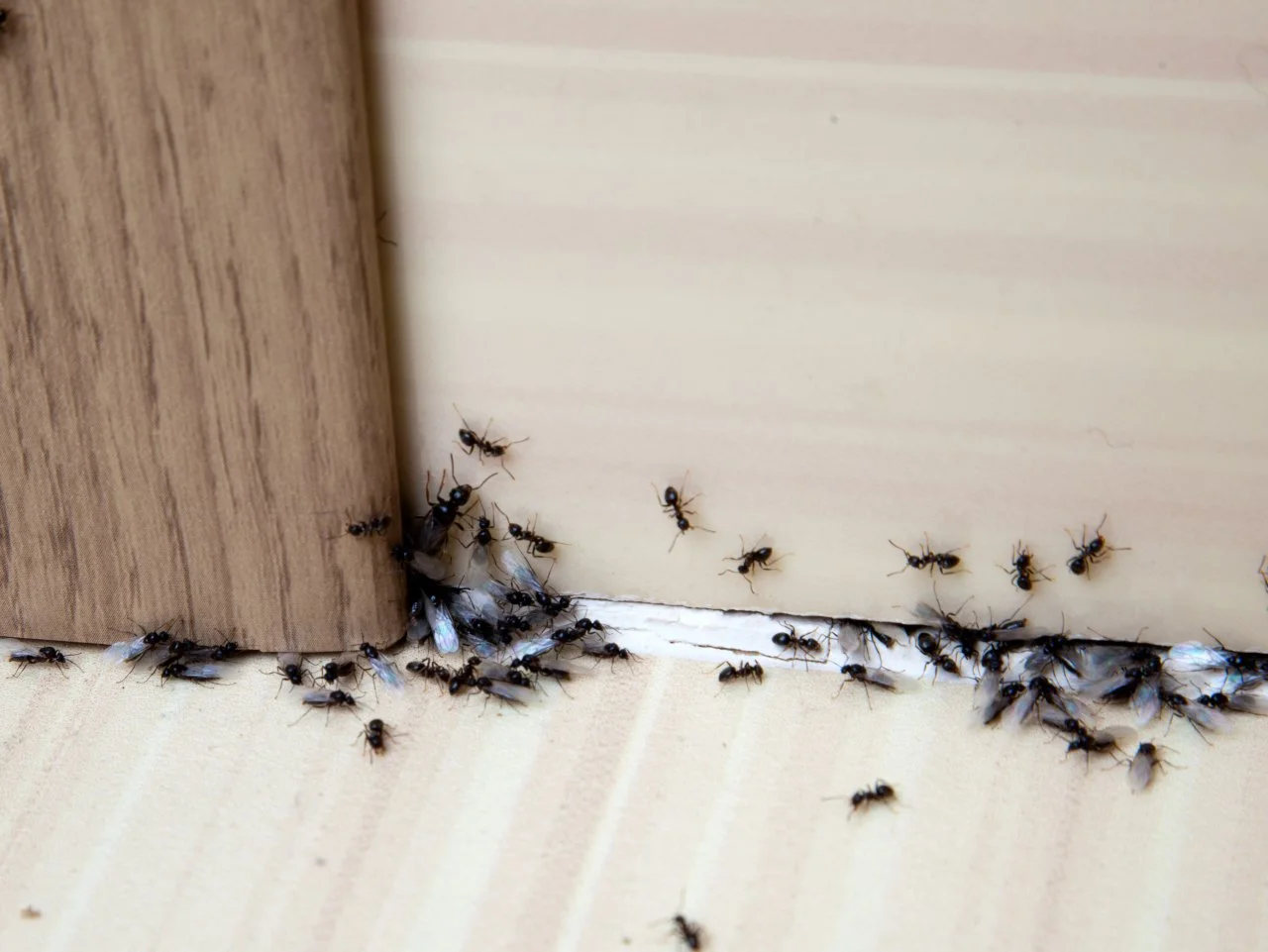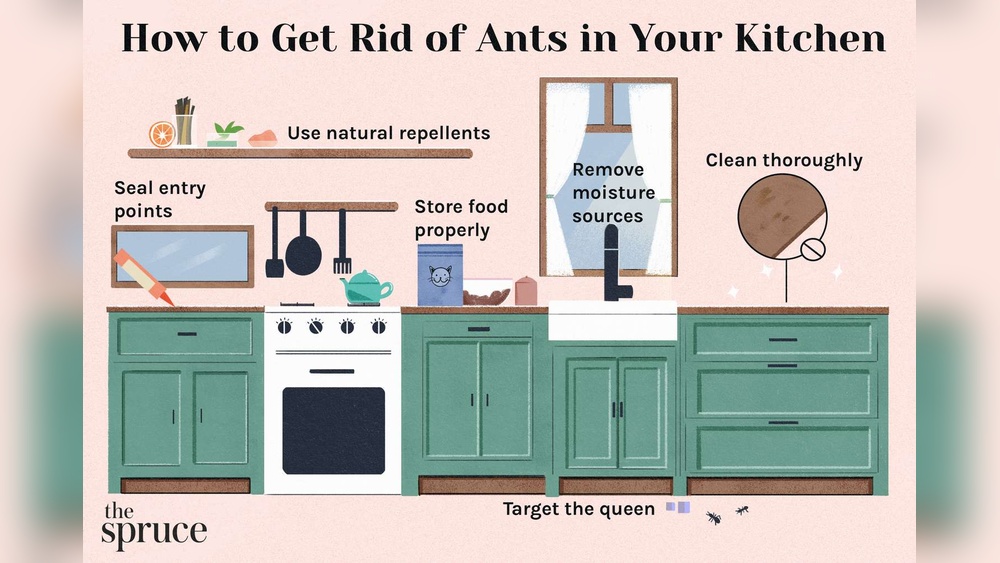Are you tired of waking up to tiny ants marching across your kitchen countertops? Those small ants can quickly turn your clean kitchen into a frustrating battleground.
But don’t worry—you’re not alone, and the good news is there are simple, effective ways to get rid of them for good. You’ll discover easy steps you can take right now to stop ants from invading your kitchen, why common remedies like vinegar only work temporarily, and how to tackle the root of the problem so these tiny pests don’t come back.
Keep reading to reclaim your kitchen and enjoy a pest-free home!

Identify Ant Types
Common kitchen ants include tiny black ants, odorous house ants, and pharaoh ants. These ants are drawn to food crumbs and moisture in kitchens. They often build nests near water sources like sinks or pipes. Ants leave behind pheromone trails to guide others to food. You might see them moving in lines along walls or counters.
Odorous house ants give off a strong smell like rotten coconut when crushed. Pharaoh ants are very small and yellowish. Tiny black ants are common and usually harmless but annoying. Understanding their behavior and habits helps to stop them effectively.
Find Ant Entry Points
Check doors and windows carefully for small gaps or holes. Ants use these spots to enter your kitchen. Look along the edges and frames. Sometimes, even tiny cracks let ants inside.
Also, inspect cracks and crevices in walls, near baseboards, and around pipes. These narrow openings are favorite entry points for ants. Use a flashlight to see better. Seal these openings with caulk or weather stripping to block ants.
Pay close attention to places where different materials meet, like wood and brick. Ants find these joints easy to slip through. Regular checks help catch new entry points early before ants make a trail inside.
Eliminate Food Sources
Clean all spills and crumbs immediately to stop ants. Wipe kitchen counters and floors daily. Crumbs left on surfaces attract ants quickly. Use a damp cloth or mop for better cleaning. Pay attention to hidden areas like under appliances and cabinets.
Store food in sealed containers to keep ants away. Use plastic, glass, or metal containers with tight lids. Avoid leaving food out in open bags or boxes. This helps block ants from smelling and reaching food.
Manage pet food carefully by feeding pets in one place. Remove leftover pet food after meals. Store pet food in airtight containers too. This reduces the chance of ants invading the kitchen.
Natural Repellents
Vinegar solutions are simple and effective for repelling ants. Mix equal parts white vinegar and water in a spray bottle. Spray it on ant entry points like doorways and windowsills. The strong smell masks the scent trails ants use to find food. Spray surfaces like countertops and floors regularly to keep ants away. Vinegar’s effect lasts only a few hours to days, so reapply often for best results. It does not kill the colony, just confuses ants temporarily.
Essential oils such as peppermint, tea tree, and lemon oil repel ants naturally. Add a few drops to water and spray in problem areas. Ants dislike the strong smell and avoid treated spots. Oils also help mask food scents that attract ants.
Common herbs and spices like cinnamon, cloves, and bay leaves work as natural barriers. Sprinkle them near ant trails, cabinets, or entry points. Their smell keeps ants away without chemicals. These natural repellents are safe and easy to use in any kitchen.
Diy Ant Traps
Mix sugar and borax to make an effective ant trap. Sugar attracts ants, while borax acts as a poison. Combine 1 part borax with 3 parts sugar. Sprinkle this mix near ant trails or entry points. Ants carry the mixture back to their nest, helping to kill the colony.
Use caution with borax around pets and children. Place traps where they cannot reach.
| Commercial Bait | How It Works | Benefits |
|---|---|---|
| Gel Baits | Ants eat the gel and share with colony | Easy to apply, targets whole colony |
| Ant Bait Stations | Ants carry poison to nest | Safe, keeps poison contained |
| Liquid Baits | Attracts ants with sweet liquid | Good for large infestations |
Maintain Kitchen Cleanliness
Keep kitchen surfaces clean by wiping counters and tables daily. Crumbs attract small ants quickly. Use a mild cleaner to remove sticky spots and food residues. Empty trash bins often to avoid smells that lure ants. Use trash bags and seal them tightly before disposal.
Fix leaks and dry wet areas because ants need moisture to survive. Wipe sinks and mop floors to remove dampness. Store food in sealed containers to prevent ants from finding snacks. Regular cleaning and dryness make your kitchen less inviting to ants.
When To Use Chemical Solutions
Choose safe insecticides labeled for indoor use. Look for products with low toxicity to humans and pets. Avoid sprays that leave strong odors or stains. Prefer baits over sprays, as they attract ants and kill the colony slowly.
Apply insecticides only on ant trails, entry points, and nests. Use small amounts to avoid spreading chemicals around. Wear gloves and keep children and pets away during application. Follow the instructions on the label carefully.
Take precautions by ventilating the area well after spraying. Store insecticides out of reach of children. Do not mix different chemicals, as this can cause dangerous reactions. Clean food surfaces before use to prevent contamination.

Prevent Future Infestations
Seal all cracks and gaps around windows, doors, and walls. Use weather stripping or caulk to block ant entry. Check plumbing and vents for small openings and seal them tightly. This stops ants from sneaking into your kitchen.
Trim plants and trees near your house. Keep grass and bushes away from walls to reduce ant trails. Remove any piles of leaves or wood that attract ants. Clean up food spills and trash outside to avoid inviting ants inside.
Inspect your kitchen and home regularly. Look for ant trails, nests, and entry points. Use a flashlight to find hidden spots. Early detection helps stop ants before they spread. Clean counters and floors often to remove crumbs and food odors that attract ants.
:max_bytes(150000):strip_icc()/TheSpruce_Howtogetridofandpreventodoroushouseants_colorv1-d55f1b3ffb8f44e1a34ba6d0a07bd4a0.png)
Frequently Asked Questions
How Long Will Vinegar Keep Ants Away?
Vinegar keeps ants away for a few hours to a few days by masking their scent trails. Reapply regularly for best results.
What Is The Best Homemade Ant Killer For The Kitchen?
The best homemade kitchen ant killer mixes equal parts white vinegar and water. Spray entry points and surfaces regularly to disrupt ant trails and repel them effectively.
What Causes Tiny Ants In The Kitchen At Night?
Tiny ants appear at night in kitchens due to food crumbs, moisture, and accessible entry points attracting them indoors.
How Do Small Ants Enter My Kitchen?
Small ants enter through cracks, gaps, windows, and doorways seeking food and water.
Conclusion
Small ants in your kitchen need quick and steady action. Clean all surfaces to remove crumbs and spills. Use natural sprays like vinegar regularly to confuse their scent trails. Seal cracks and entry points to stop new ants from coming in.
Keep food stored tightly in containers. Persistence matters; don’t give up after one try. With care and patience, your kitchen will stay ant-free. Stay consistent, and enjoy a clean, pest-free space every day.

Yes, working as , Food Blogger and Product Reviewer for last 6 years. Here you will get amazing deals for Smart kitchen products. I am your best source for the latest update in cooking trends. I provide insightful articles, reviews, and analysis on cutting-edge kitchen gadget. My mission is to empower readers with the knowledge they need to stay ahead in a rapidly evolving coking world. Join me as we explore the future of food technology and how it shapes our lives today and tomorrow.





